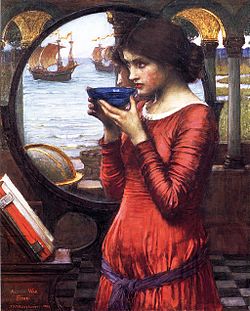 Destiny by John William Waterhouse (1900) | |
| Gender | Primarily feminine |
|---|---|
| Origin | |
| Word/name | English |
| Meaning | "destiny, fate", to determine |
| Other names | |
| Related names | Hessa (name), Moira (given name) |

Destiny is a primarily feminine given name meaning "destiny", "fate", which is ultimately derived from the Late Latin word destinata. Commonly used spelling variants include Destinee, Destiney, and Destinie. [1]